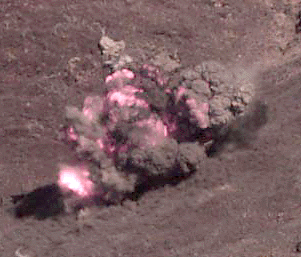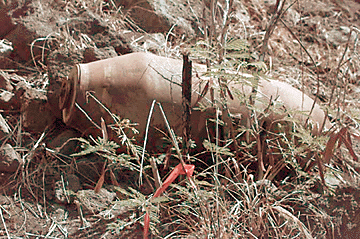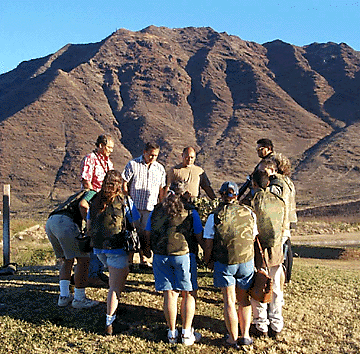


Army detonates
bombs at Makua
Two bombs lay near
By Gregg K. Kakesako
archaeological sites sacred
to Hawaiians
Star-BulletinThe Army blew up five World War II explosives today, including a 1,000-pound bomb at its Makua Military Reservation.
The bomb was lodged on the valley's north ridge, about 1,155 feet above the Ukanipo Heiau.
Clarence De Lude, a member of the group Koa Mana, said only a small kiawe tree held the bomb in place.
De Lude and Glen Kila inspected the bomb site several weeks ago to help the Army determine what should be done.

Koa Mana represents Waianae residents who were evicted from Makua Valley in the 1930s when the Army confiscated the land for training purposes, Kila said.The two men planned to inspect the heiau later today for any damage done.
Also exploded this morning were a 100-pound bomb and three mortars. The 100-pound bomb was located 660 feet from the heiau and 150 feet from a burial site in the 4,190-acre training range.
Sandbags were used to contain the blast from the 100-pound bomb.
The mortar rounds were blown up but were not close to the heiau or burial site.
The 1,000-pound bomb was the last to be detonated in an operation that lasted less than 15 minutes.
A small red fireball of debris and smoke rose from the site, and its blast echoed throughout the valley.
Besides Kila and De Lude, members of the Ukanipo Council, all residents of Waianae, also were invited to observe the Army's operation.
Following the detonation, Kila expressed sadness, noting that the valley is "our mother" and "this impacts upon us spiritually."
But Kila praised Maj. Gen. James Hill, commanding general of the 25th Division, for his understanding of the needs of native Hawaiians.
"We are happy the military gave us the right to participate in the decision that affected our lives and culture. But we do not want this to be a precedent," Kila said. "Our vision is to return life here."
Yesterday, Capt. Nathan London, commander of the 706th Ordnance Company, said more safety concerns would be taken into consideration because of the archaeological significance of the heiau.
London said his team of 14 explosives experts would limit the fragmentation and direct it away from the heiau.
"We plan to countercharge the main charge," London said, "by covering a portion of the bomb with another explosive charge to limit the fragmentation."
The Ukanipo Heiau is located at the front of Kahanahaiki Valley, one of three valleys that make up the military reservation.
Some archaeologists believe the heiau was a place where bodies of the alii were placed until they were ready for burial in a designated cave. Other archaeologists believe that the heiau was a luakini, reserved for use by chiefs as a place of human sacrifice.

Farrington Highway fronting Makua Valley and Makua Beach was closed for several hours during the operation, which began at 6 a.m. and ended at 9:30 a.m. The Coast Guard also patroled the waters off of the beach.London said his company of 30 soldiers handles about 20 to 30 requests annually from local law enforcement officials. These include sending a team to Kauai recently to dispose of dynamite that was found by a civilian.
"We now have a team on Molokai disposing of a Navy round and one on the Big Island taking care of a mortar round," London said.
The Waianae range provides the only live-fire combat training on Oahu for the Army and the Marine Corps. The Army has said that 80 percent of live-fire training on Oahu by soldiers and Kaneohe Marines takes place in Makua. Until 1989, rockets and missiles were fired in the valley.
The Army recently halted training at Makua for four months while it consulted with the U.S. Fish and Wildlife Service about the effects of training exercises on endangered plants and animals in the area.
To halt further firing in the valley, the Earthjustice Legal Defense Fund filed a complaint in federal court, saying the Army needs an environmental impact statement before it resumes its operations there.
Army lawyers say no such statement is needed, since the operations in Makua predate the law cited by environmentalists. The Army says that most of the rare and endangered plants and animals are found on the remote ridges of the Waianae mountain range.